Exam 10: Money, the Federal Reserve, and the Interest Rate
Exam 1: The Scope and Method of Economics238 Questions
Exam 2: The Economic Problem: Scarcity and Choice220 Questions
Exam 3: Demand, Supply, and Market Equilibrium298 Questions
Exam 4: Demand and Supply Applications173 Questions
Exam 5: Introduction to Macroeconomics241 Questions
Exam 6: Measuring National Output and National Income292 Questions
Exam 7: Unemployment, Inflation, and Long-Run Growth297 Questions
Exam 8: Aggregate Expenditure and Equilibrium Output355 Questions
Exam 9: The Government and Fiscal Policy362 Questions
Exam 10: Money, the Federal Reserve, and the Interest Rate358 Questions
Exam 11: The Determination of Aggregate Output, the Price Level, and the Interest Rate243 Questions
Exam 12: Policy Effects and Cost Shocks in the Asad Model200 Questions
Exam 13: The Labor Market in the Macroeconomy287 Questions
Exam 14: Financial Crises, Stabilization, and Deficits260 Questions
Exam 15: Household and Firm Behavior in the Macroeconomy: a Further Look364 Questions
Exam 16: Long-Run Growth196 Questions
Exam 17: Alternative Views in Macroeconomics294 Questions
Exam 18: International Trade, Comparative Advantage, and Protectionism301 Questions
Exam 19: Open-Economy Macroeconomics: the Balance of Payments and Exchange Rates308 Questions
Exam 20: Economic Growth in Developing Economies133 Questions
Exam 21: Critical Thinking About Research105 Questions
Select questions type
The amount of money you should hold depends negatively on the interest rate.
Free
(True/False)
4.9/5  (32)
(32)
Correct Answer:
True
If interest rates decrease to a very low level, people will most likely hold
Free
(Multiple Choice)
4.8/5  (40)
(40)
Correct Answer:
C
Refer to the information provided in Table 10.6 below to answer the questions that follow.
Table 10.6  -Refer to Table 10.6. Commerce Bank's excess reserves equal
-Refer to Table 10.6. Commerce Bank's excess reserves equal
Free
(Multiple Choice)
5.0/5  (32)
(32)
Correct Answer:
A
When Argentina experiences a period of high inflation and Argentineans lose confidence in their peso as a store of value, which of the following would be least likely to occur?
(Multiple Choice)
4.7/5  (36)
(36)
As the interest rate rises, people hold ________ money in non-interest-bearing checking accounts instead of savings accounts because the opportunity cost of holding money has ________.
(Multiple Choice)
4.8/5  (34)
(34)
Government securities with terms of more than one year are called
(Multiple Choice)
4.8/5  (29)
(29)
When a bank has no excess reserves, and thus can make no more loans, it is said to be
(Multiple Choice)
4.8/5  (36)
(36)
The discount rate cannot be used to control the money supply with great precision because its effects on banks' demand for reserves are uncertain.
(True/False)
4.9/5  (34)
(34)
After World War II, cigarettes were used as money in Germany. This is an example of
(Multiple Choice)
4.9/5  (38)
(38)
In April 2015, the assets with the largest value on the Fed's balance sheet was
(Multiple Choice)
4.8/5  (36)
(36)
The Federal Reserve System consists of ________ Federal Reserve Banks.
(Multiple Choice)
4.9/5  (36)
(36)
Money is anything that generally is accepted as a medium of exchange.
(True/False)
4.9/5  (35)
(35)
Showing 1 - 20 of 358
Filters
- Essay(0)
- Multiple Choice(0)
- Short Answer(0)
- True False(0)
- Matching(0)